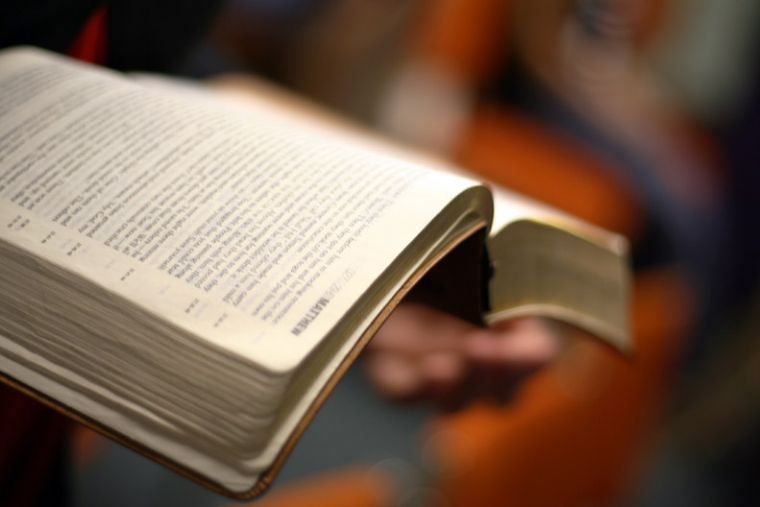What is the Chicago Statement on Biblical Inerrancy, and should evangelicals believe it? (original) (raw)
The Chicago Statement on Biblical Inerrancy, adopted this week by Moody Bible Institute, came out of a conference on biblical inerrrancy in October 1978. More than 200 evangelical leaders crafted it, among them famous figures such as JI Packer, Francis Schaeffer and RC Sproul.
The background to the Statement was a perceived 'liberal' drift in evangelicalism in the US, with questions increasingly being asked about traditional conservative ways of interpreting the Bible. Was it possible, for instance, to be a conservative evangelical and not believe in the literal interpretation of Genesis 1 and 2? Was Noah's Flood really world-wide, or could it be read in a different way, as a theological meditation on an actual event that need not be taken as precisely factual?

What does it mean to say the Bible is inerrant?texbeck
The battles between evangelical conservatives and 'moderates' were extensive and bitter, epitomised in the struggle for control of the giant Southern Baptist Convention. In what is characterised by the eventual victors as the 'conservative resurgence' and by the losers as the 'fundamentalist takeover', moderates lost positions on key committees and the denomination shifted sharply to the theological right.
Biblical inerrancy - the view that the Bible is without error in anything it affirms – was at the heart of these battles and others. (It is not quite the same as biblical infallibility, which stresses that the Bible is the text God intended us to have and that it is entirely trustworthy in everything regarding faith and salvation.)
However, there's still a question about what inerrancy actually means. How far is it possible to interpret the biblical text in the light of modern science or developments in biblical scholarship? The 1978 Chicago Statement's answer was 'not very far.' Julie Roys in her account refers to the 'correspondence' view of truth assumed by Chicago, in which a statement means exactly what it says: 'Or in terms of inerrancy, a correspondence view means accepting that what the text says happened actually happened, whether it be forming a man from the dust of the earth or walls collapsing around Jericho.'
But is Chicago really the last word on the subject?
The Chicago declaration consists of a 'Short Statement' of five clauses and a series of 19 'Articles' framed as affirmations and denials. While many of them are uncontroversial to most evangelicals, some are deliberately designed to express an ultra-conservative position. For instance, Article XII says: 'WE DENY that Biblical infallibility and inerrancy are limited to spiritual, religious, or redemptive themes, exclusive of assertions in the fields of history and science. We further deny that scientific hypotheses about earth history may properly be used to overturn the teaching of Scripture on creation and the flood.'
In the minds of the Chicago framers, belief in biblical inerrancy requires adherence to young-earth creationism.
In a recognition of the different cultural and intellectual climate of the Bible's composition, it says: 'WE DENY that it is proper to evaluate Scripture according to standards of truth and error that are alien to its usage or purpose,' citing irregularities of grammar, the use of 'hyperbole and round numbers' and 'variant selections of material in parallel accounts' (Article 13).
However, it says there are no contradictions or mistakes, and denies that 'alleged errors and discrepancies that have not yet been resolved vitiate the truth claims of the Bible'.
The Chicago Statement is a thoroughgoing attempt to create a conservative definition of inerrancy. But it is not the only one, and many scholars would argue it is possible to hold to a version of inerrancy that is not as literalist as Chicago appears to require – or to be thoroughly orthodox without using the word at all.
One trenchant critic is theologian Roger Olson, who wrote a blog post in 2016 on the subject. He says: 'When I look at the Chicago Statement on inerrancy and its signatories I believe it is more a political (in the broad sense) statement than a clear, precise, statement of perfect agreement among the signatories. In other words, what was really going on there, in my humble opinion, was driven by a shared concern to establish and patrol "evangelical boundaries."'
In another post, he describes some of the arguments between evangelicals over inerrancy during the last few decades, and reflecting on his own reluctance to use the term, says: 'It is simply too fraught with all kinds of difficulties and problems and there are too many very different meanings of it. It functions as nothing more than a shibboleth – at least to educated inquiring minds who know about its difficulties and problems. And yet, it keeps being used as a shibboleth by evangelical gatekeepers.'
One way of looking at developments at Moody Bible Institute is to see it as another example of that shibboleth at work. It's hard to see that the views expressed in the Chicago Statement are remotely as fundamental as its signatories believe – in an article on 'Evangelical Doctrines of Scripture in Transatlantic Perspective', Stephen Holmes describes them as 'new in theological history' and compares inerrancy in the US with the UK, where conservative theology has developed differently.
But the times aren't conducive to nuance in the evangelical world; any apparent concession to 'liberalism' is regarded as the first step on the slippery slope to apostasy. Patrolling the boundaries of the evangelical world is still possible, as the Moody case shows; whether it's desirable is another question altogether.
Follow Mark Woods on Twitter: @RevMarkWoods